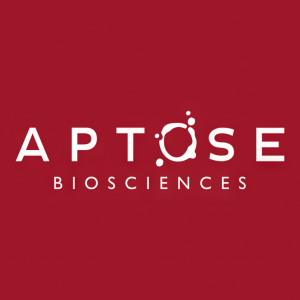Aptose Provides Clinical Update for the Tuspetinib-based Triple Drug Frontline Therapy in Newly Diagnosed AML Patients from the Phase 1/2 TUSCANY Trial
Rhea-AI Summary
Positive
- Strong efficacy with 6 out of 7 patients achieving complete remission or CRi across both dose cohorts
- Treatment effective against difficult-to-treat mutations including TP53-mutated/CK and FLT3-wildtype AML
- Favorable safety profile with no dose-limiting toxicities reported in both dose cohorts
- Multiple patients achieved MRD-negative status, indicating deep responses
Negative
- Small patient sample size (only 7 patients total) limits conclusiveness of results
- One patient at 40mg dose did not respond and was discontinued from treatment
Insights
Aptose's triplet therapy shows promising early results in AML, achieving complete remissions in high-risk patients with favorable safety profile.
The early data from Aptose's TUSCANY trial demonstrates promising efficacy signals for their tuspetinib-based triplet therapy. The achievement of complete remissions (CR/CRi) in 6 out of 7 patients across two dose cohorts (40mg and 80mg) is noteworthy, especially considering these are newly diagnosed AML patients ineligible for standard induction chemotherapy.
Particularly impressive is the activity observed in patients with TP53 mutations and complex karyotype, historically among the most challenging AML subgroups with dismal prognosis and limited treatment options. The fact that two such patients achieved remissions (one with MRD negativity) suggests tuspetinib may address a critical unmet need in AML treatment.
The MRD (measurable residual disease) negativity observed in multiple patients is clinically significant. In AML, MRD negativity correlates strongly with reduced relapse risk and improved survival outcomes. The triple combination appears effective across diverse mutation profiles beyond just FLT3-mutated disease, including IDH2 mutations and FLT3-wildtype patients.
From a safety perspective, the absence of dose-limiting toxicities at both dose levels is encouraging. AML patients are often elderly with comorbidities, making tolerability a crucial consideration. The 80mg dose showing favorable safety while maintaining efficacy appears to justify the company's designation of this as the "optimal dose."
However, several limitations warrant caution. The sample size remains extremely small (only 7 patients total), and follow-up duration is still short. The durability of responses - a critical factor in AML treatment success - cannot yet be assessed. Additionally, one patient at the 40mg dose did not respond, highlighting that not all patients benefit from this approach.
The planned enrollment of 18-24 patients by mid-late 2025 will provide more comprehensive data on efficacy, safety, and durability across diverse AML genetic subtypes. If these early results hold in a larger cohort, tuspetinib could potentially enhance the standard venetoclax/azacitidine regimen, particularly for high-risk genomic subtypes where current options are limited.
Aptose is developing TUS+VEN+AZA as a one-of-a-kind safe and mutation agnostic frontline triple drug therapy for newly diagnosed AML patients
First two dose cohorts of TUS+VEN+AZA triplet demonstrate safety, complete remissions, and MRD negativity across patients with diverse mutations, including TP53-mutated/CK AML and FLT3-wildtype AML patients
SAN DIEGO and TORONTO, May 05, 2025 (GLOBE NEWSWIRE) -- Aptose Biosciences Inc. (“Aptose” or the “Company”) (TSX: APS; OTC: APTOF), a clinical-stage precision oncology company, today reported updated and new data from Aptose’s Phase 1/2 TUSCANY trial in newly diagnosed acute myeloid leukemia (AML) patients dosed with a 40 mg or 80 mg dose of tuspetinib (TUS) in combination with standard of care dosing of venetoclax and azacitidine (TUS+VEN+AZA triplet). The TUS+VEN+AZA triplet is being developed as a safe and mutation agnostic frontline therapy to treat large, mutationally diverse populations of newly diagnosed AML patients who are ineligible to receive induction chemotherapy.
Earlier this year, Aptose announced the initiation of the TUSCANY trial and dosing in newly diagnosed AML patients at an initial dose of 40 mg TUS in the first cohort of four patients. The second cohort of patients is now receiving 80 mg TUS. Data from the first two cohorts, with a 40 mg or 80 mg dose of tuspetinib in the TUS+VEN+AZA combination, reveal promising clinical safety and antileukemic activity.
- To date, four newly diagnosed AML patients received the initial dose of TUS (40 mg) as part of the (TUS+VEN+AZA) combination.
- Notably, a patient with biallelic TP53 mutations and a complex karyotype (TP53-mutated/CK) and FLT3-wildtype achieved a complete remission (CR) and the clinical site reported no measurable residual disease (MRD-negative status) in this patient.
- One FLT3-wildtype patient having an IDH-2 mutation achieved a CR and MRD-negative status.
- Another FLT3-wildtype patient achieved a CRi during Cycle 1 and MRD-negative status.
- The first three patients continue on treatment, while a fourth patient did not respond at this 40 mg dose level of TUS and was discontinued.
- The 40 mg dose of the TUS+VEN+AZA triplet remains safe, and no dose-limiting toxicities (DLTs) have been reported.
- To date, three newly diagnosed AML patients having diverse mutation profiles have received the 80 mg of TUS, as part of the TUS+VEN+AZA combination. The 80 mg TUS dose has been considered the optimal dose that has demonstrated safety and consistent blood exposure levels that exert potent antileukemic activity.
- All patients achieved blast reductions in Cycle 1 that met the criteria for complete remissions (CR or CRi) and continue on treatment.
- Notably, another TP53-mutated/CK and FLT3-wildtype patient achieved blast reductions that met CRi criteria in Cycle 1 and is now receiving additional therapy in Cycle 2.
- The second patient, having FLT3-wildtype status, achieved a CR.
- The third patient, having FLT3-ITD and NPM1 mutations and entering the trial with a
75% bone marrow blast count, achieved a CRi.
- All three patients are early in their course of treatment and are expected to show further improvements in their disease status as they are all continuing with treatment, and MRD status will be monitored as the patients move through their courses of therapy.
- The 80 mg dose of TUS, as part of the TUS+VEN+AZA triplet, continues to show favorable safety with no dose-limiting toxicities (DLTs) having been reported.
- All patients achieved blast reductions in Cycle 1 that met the criteria for complete remissions (CR or CRi) and continue on treatment.
“The treatment paradigm for AML is shifting to triplet combination therapy,” said Rafael Bejar, M.D., Ph.D., Chief Medical Officer of Aptose. “We have always maintained that tuspetinib, with its notable safety profile and ability to treat the larger, difficult-to-treat AML populations with high-risk mutations, could be an ideal drug for a triplet combination therapy in the frontline setting. With the majority of patients already achieving complete responses -- including early responses in patients with adverse mutations -- the clinical findings to date are bearing that out.”
William G. Rice, Ph.D., Chairman, President and Chief Executive Officer of Aptose, will review the data at a presentation today, Monday, May 5th, 2025, 3:00 p.m. EDT, at the 2025 Bloom Burton & Co. Healthcare Investor Conference. The presentation and webcast can be accessed here and will be available on the Aptose website.
TUSCANY: TUS+VEN+AZA Triplet Phase 1/2 Study
Tuspetinib based TUS+VEN+AZA triplet therapy is being advanced in the TUSCANY Phase 1/2 trial with the goal of creating an improved frontline therapy for newly diagnosed AML patients that is active across diverse AML populations, durable, and well tolerated. Earlier APTIVATE trials of TUS as a single agent and in combination as TUS+VEN demonstrated favorable safety and broad activity in diverse relapsed or refractory (R/R) AML populations that went beyond the more prognostically favorable NPM1 and IDH mutant subgroups. Responses to TUS were also observed in those with prior-VEN and prior-FLT3 inhibitor (FLT3i) therapies, those with highly adverse TP53 and RAS mutations, and those with mutated or unmutated (wildtype) FLT3 genes.
The TUSCANY triplet Phase 1/2 study is designed to test various doses and schedules of TUS in combination with standard dosing of AZA and VEN for patients with AML who are ineligible to receive induction chemotherapy. A convenient, once daily oral agent, TUS will be administered in 28-day cycles, beginning at 40mg once daily, with dose escalations planned after a safety review of each dose level. Multiple U.S. sites are enrolling in the TUSCANY trial with anticipated enrollment of 18-24 patients by mid-late 2025. Data will be released as it becomes available.
More information on the TUSCANY Phase 1/2 study can be found on www.clinicaltrials.gov (here).
About Aptose
Aptose Biosciences is a clinical-stage biotechnology company committed to developing precision medicines addressing unmet medical needs in oncology, with an initial focus on hematology. The Company’s lead clinical-stage, oral kinase inhibitor tuspetinib (TUS) has demonstrated activity as a monotherapy and in combination therapy in patients with relapsed or refractory acute myeloid leukemia (AML) and is being developed as a frontline triplet therapy in newly diagnosed AML. For more information, please visit www.aptose.com.
Forward Looking Statements
This press release may contain forward-looking statements within the meaning of Canadian and U.S. securities laws, including, but not limited to, statements relating to the therapeutic potential and safety profile of tuspetinib (including the triplet therapy) and its clinical development, the anticipated enrollment rate in the TUSCANY trial and the timing thereof, as well as statements relating to the Company’s plans, objectives, expectations and intentions and other statements including words such as “continue”, “expect”, “intend”, “will”, “should”, “would”, “may”, and other similar expressions. Such statements reflect our current views with respect to future events and are subject to risks and uncertainties and are necessarily based upon a number of estimates and assumptions that, while considered reasonable by us are inherently subject to significant business, economic, competitive, political and social uncertainties and contingencies. Many factors could cause our actual results, performance or achievements to be materially different from any future results, performance or achievements described in this press release. Such factors could include, among others: our ability to obtain the capital required for research and operations and to continue as a going concern; the inherent risks in early stage drug development including demonstrating efficacy; development time/cost and the regulatory approval process; the progress of our clinical trials; our ability to find and enter into agreements with potential partners; our ability to attract and retain key personnel; changing market conditions; inability of new manufacturers to produce acceptable batches of GMP in sufficient quantities; unexpected manufacturing defects; and other risks detailed from time-to-time in our ongoing quarterly filings, annual information forms, annual reports and annual filings with Canadian securities regulators and the United States Securities and Exchange Commission.
Should one or more of these risks or uncertainties materialize, or should the assumptions set out in the section entitled "Risk Factors" in our filings with Canadian securities regulators and the United States Securities and Exchange Commission underlying those forward-looking statements prove incorrect, actual results may vary materially from those described herein. These forward-looking statements are made as of the date of this press release and we do not intend, and do not assume any obligation, to update these forward-looking statements, except as required by law. We cannot assure you that such statements will prove to be accurate as actual results and future events could differ materially from those anticipated in such statements. Investors are cautioned that forward-looking statements are not guarantees of future performance and accordingly investors are cautioned not to put undue reliance on forward-looking statements due to the inherent uncertainty therein.
For further information, please contact:
Aptose Biosciences Inc.
Susan Pietropaolo
Corporate Communications & Investor Relations
201-923-2049
spietropaolo@aptose.com








